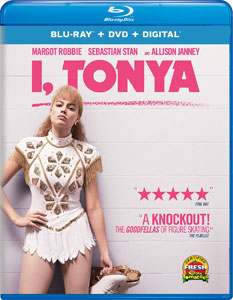Historical sports dramas – say, “42” or “Battle of the Sexes” — tend to be played straight; the true story alone is dramatic enough, and that’s why a movie is being made about it. “I, Tonya” (2017), now available on home video, is different. Tonya Harding’s life story is so bizarrely off the beaten path of sports biographies that if you told it straight, no one would believe it.
So writer Steven Rogers and director Craig Gillespie lean into the insane moments from the figure skater’s life – many of which even the most casual sports fan saw splashed across the news during the Nancy Kerrigan assault incident in 1994 – and end up with a perfect tragi-comedy that ultimately does what biographies are supposed to do: Let you know the person, for better or worse.
We see recreations of (irony-free, as a title card tells us) interviews with the major players, and Tonya (Margot Robbie) and other characters occasionally break the fourth wall to give us their thoughts. During a training montage more absurd than “Rocky IV’s,” Tonya’s coach (Julianne Nicholson) assures us that “This really happened.”
Although the drama of Harding’s lace breaking in the 1994 Olympics — where she eventually finished eighth — is a juicy story on its own, a casual viewer will remember Harding’s makeup. So “I, Tonya” features a sequence of the skater caking it on, trying to smile into the mirror but looking more garish than Robbie’s Harley Quinn from “Suicide Squad.” Tonya is hoping to impress the judges, media and fans – some of whom had turned on her after her rival was whacked in the knee the day before the U.S. nationals the previous month.
The film convincingly argues that Harding had no chance. She grows up dirt poor in Oregon (where she’s played by Mckenna Grace of “Gifted”), and although she often gives as good as she gets, Tonya goes straight from her psychologically and physically abusive mother, LaVona (Best Supporting Actress winner Allison Janney), to husband Jeff Gillooly (Sebastian Stan).
Tonya and Jeff are that classic couple who beat the crap out of each other, forgive each other, then repeat the cycle. An undercurrent of sweetness is hard to shake, though, as neither of them have eyes for anyone else. LaVona berates her daughter for marrying the first guy who tells her she’s pretty, which might be a valid point. But on the other hand, Jeff IS the first guy to tell her she’s pretty, so that’s not nothing, right?
The kneecapping of Kerrigan (Caitlin Carver) springs from the mind of Shawn Eckhardt (Paul Walter Hauser), who wants to make a name for himself, even if notoriously. “I, Tonya” shows how Shawn takes advantage of the unquestioning lifelong friendship of Jeff. Not that you’d call their friendship warm, but Shawn is in the background of every scene where we see Jeff outside of moments with Tonya. As Jeff gets dragged into Shawn’s sub-“Fargo”-level schemes, Tonya gets dragged into Jeff’s.

Playing as an undercurrent throughout “I, Tonya” – without being pounded home until her late-movie courtroom breakdown – is the sweetest thing about the sport’s greatest villainess: She loves figure skating. It’s never explained why she latches onto this particular passion at age 4, but that unconditional love makes her story all the more heartbreaking. A viewer gets the sense that her knowledge of the Kerrigan attack was peripheral at best, because she was thinking about skating, as always.
The film doesn’t delve into skating specifics aside from a brief explanation of how hard a triple axel is, and why it’s noteworthy that Tonya can land the jump while her competitors don’t bother trying. Yet it’s still a great figure skating movie. Not only the costumes (hand-made by Tonya) and hairstyles (obviously chosen by Tonya), but also the specific moves are copied from real competitions. Vintage TV graphics are superimposed over Robbie, with the film manipulated to look grainy. These tricks combine to take us back to those times.
Gillespie often gives us close-ups of Tonya’s facial expressions, but we do get enough wide shots of the stunt double performing Harding’s moves to appreciate what a strong all-around performer she was before the 1994 debacle.
A side benefit of “I, Tonya” is that it makes us appreciate the fact that the USA had at least two elite skaters (actually more, if you want to dig into it) 25 years ago. When people spoke of the world’s best skaters, they were inevitably hitting on the best American skaters in that conversation. It’s sobering how times have changed.
So while “I, Tonya” is about the person and the people around her more so than the skating, it will inspire people to dip into YouTube and watch Harding’s routines. While she often railed at judges’ numbers and never won an Olympic medal (she took fourth in 1992), she was one of the best figure skaters of her era. In one final oddity, this film will spark renewed appreciation of Tonya Harding as a figure skater.

